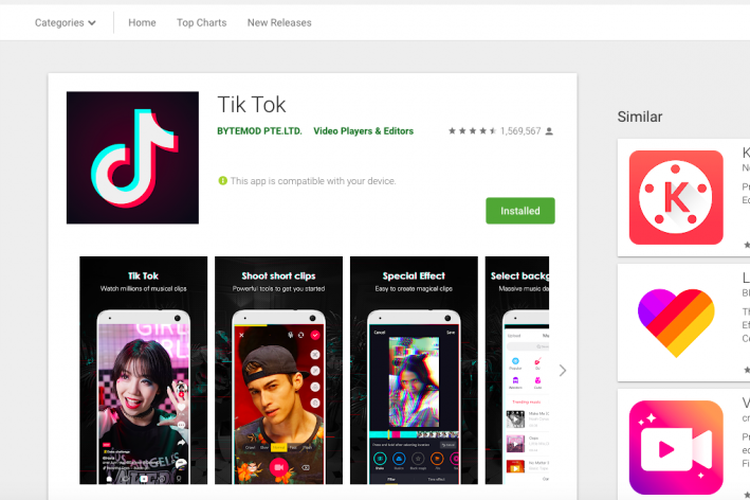Indonesia’s Ministry of Communication and Information Technology (Kemkominfo) has confirmed that they have officially blocked access to Tik Tok, an app used for making and sharing short music videos, starting yesterday afternoon.
“A lot of the content (on Tik Tok) is negative, especially for children,” Rudiantara, head of Kemkominfo, told Detik yesterday when asked why the app had been blocked. “There are some things that are indecent, not educational and just not appropriate for children.”
Tik Tok, created by Chinese developer Toutiao, has become one of the fastest growing apps in the world with about 150 million active users daily. The main function of the app gives users the ability to create and edit 15-second music videos, but it’s Tik Tok’s social media aspects that have propelled it to become one of the most popular in the world, especially among children.
Indonesia has stringent Internet censorship guidelines, especially relating to pornographic content. However, despite some allegation of users posting videos featuring provocative dancing in inappropriate clothing, it would appear that Tik Tok’s current censorship and reporting system already does a good job of keeping nudity and other explicitly pornographic content off the app.
So what is the “negative content” that Rudiantara was referring to? According to him, Kemkominfo had received 2,853 reports from the public regarding the app and the decision to block it came after consultations with the Ministry of Women and Children’s Empowerment and the Indonesian Child Protection Commission.
Another Kemkominfo spokesperson did say that the app has been reported for pornography and religious harassment among other violations, but did not give more specifics.
Some Indonesian netizens had been pushing the government to enact the ban, with one Change.org petition having garnered over 140,000 signature. One example of Tik Tok’s negative influence on children mentioned by the petition is a video of one young girl dancing to Wiz Khalifa’s “See You Again” before cutting to her mourning over the body of a dead relative.
The petition also makes reference to videos in which young girls dance while showing their aurat (the Islamic term for parts of the body that should be covered for the sake of modesty) which we suspect is where the reports of alleged pornography come from.
https://www.youtube.com/watch?v=G3NcMAhVc7Q
Rudiantara noted that Kemkominfo has previously banned Bigo, a live-streaming video app, over negative content, but that they lifted the ban after the app’s developer promised to put in place additional safeguards. He suggested it would be possible for Tik Tok’s developers to do the same.
Unlike many of Kemkominfo’s previous blocks of popular apps such as Telegram and websites such as Tumblr, a significant number of Indonesians seem to support the ban on Tik Tok, with many arguing that the app was useless, a waste of time and a bad influence on children. A seemingly smaller number of netizens have spoken out against the ban, usually on the principle that the app already had internal censorship and reporting systems and that parents should be the ones responsible for protecting their children from content they deem inappropriate.




